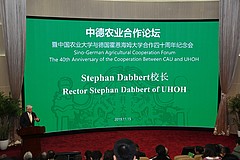Forty years of Sino-German Cooperation [15.11.19]
From "reconstruction aid" to cooperation among equals: Starting from the private initiative of a few professors at the end of the 1970s, a widely acclaimed research collaboration between the University of Hohenheim and the China Agricultural University (CAU) in Beijing has developed. Up to now, both institutions have established themselves as the No. 1 universities in agricultural sciences of their respective countries.
It is still nighttime in Germany as the Rector of the University of Hohenheim begins his speech in Beijing on Friday, 15 November. „Today, I am very glad to be looking back on 40 years of intensive cooperation which mainly served two common goals: Achieving an adequate food supply for the population and the progressive reduction of environmental pollution in agriculture", Prof. Dr. Stephan Dabbert declared.
In the meantime, much of what was started as pilot projects by both universities has established itself as Sino-German cooperation. „In Germany and in Europe Chinese visiting students form the largest group of international students. Chinese PhD students who once received their education in Hohenheim are now working as professors in China – and I am looking forward to the day when this will also be the case vice-versa.“
From reconstruction to cooperation at eye level
In fact one need not look far into the future for such a vision: For the past 15 years both universities have been qualifying PhD students in tandems via International Research Training Groups. The scientific quality is high: In the latest rankings the China Agricultural University has even risen to No. 2 in agricultural sciences world-wide .
The cooperation had begun with reciprocal visits in the year 1979. Since 1980 professors from Hohenheim gave courses in China and carried out small reseach projects there.
From 1984 to 1994 the former Gesellschaft für Technische Zusammenarbeit (GTZ) supported scientific groundwork in China. This included setting up laboratories, training young scientists and technical personnel, as well as carrying out scientific workshops. The outcomes included: More than 500 scientific publications and 23 scientific awards.
The turn of the millennium marked the beginning of the era of cooperation at eye level. The German Federal Ministry of Education and Research (BMBF) and the National Natural Science Foundation of China (NSFC) jointly funded the research project „Sustainable Agriculture in the North China Plain“ from 1999 to 2003.
In 2004 both universities initiated the first Sino-German International Research Training Group (IRTG) for joint education of PhD students. The focus lay on „Modeling Material Flows and Production Systems for Sustainable Resource Use in Intensified Crop Production in the North China Plain”. The funding by the German Research Foundation (DFG) and the Chinese Ministry of Education (MOE) had a duration from 2004 to 2013.
Currently, German and Chinese PhD students are carrying out research in tandems in the latest Sino-German IRTG on the topic of „Adaptation of maize-based food-feed-energy systems to limited phosphate resources” (AMAIZE-P).
Expansion of Sino-German research collaboration to other academic fields
In the meantime, the spirit of Sino-German cooperation has also captured other academic fields at the University of Hohenheim. The project „China Competence in Hohenheim" (CHIKOH) may serve as the latest example.
CHIKOH is preparing scientists and future graduates for cooperation with China and is developing a competence network on China-relevant topics. The German Ministry of Education and Research (BMBF) is supporting the project as one of four "lighthouse projects" in the framework of its programme „Innovative Concepts for Strengthening the China Competence at German Universities“.






